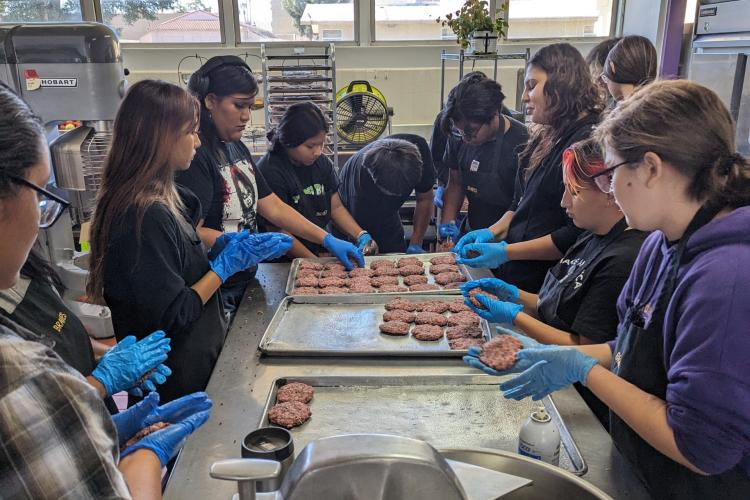Goals for Nutrition Education in BIE Schools
Purpose:
This policy underscores the importance of celebrating and integrating traditional Indigenous foods and agriculture in school settings. The purpose is to respect and honor Indigenous heritage, encourage the preservation of traditional agricultural practices, improve student and community health, promote partnerships with Indigenous producers and gardeners, and deepen students' appreciation of diverse culinary and agricultural practices. Through this policy, the Bureau of Indian Education (BIE) commits to supporting the Indigenous food initiative to enrich educational experiences by bringing valuable cultural and nutritional insights into BIE programs.

BIE-operated and Tribally Controlled schools that are not currently participating in the Indigenous Food Hubs Programs can contact the BIE National Nutrition for more guidance and technical assistance in adopting this program into their schools. For more information on the Indigenous Foods Hubs, visit: https://www.bie.edu/indigenous-food-hubs.
Scope:
This policy applies to the BIE-operated schools participating in the Indigenous Food Hubs Program. The BIE recommends that other BIE-operated schools and Tribally Controlled Schools review this policy and consider adopting these recommendations.
Policy:
- It is the policy of BIE to work towards strengthening food sovereignty in Indigenous communities through its Indigenous Food Hubs Program. Currently five BIE-operated schools are participants in this program and work with the BIE National Nutrition Consultant to implement the following practices:
- Integrate local Indigenous foods and agriculture education into school lessons.
- Facilitate learning experiences that highlight the cultural significance and traditional practices associated with Indigenous foods and agriculture.
- Provide diverse food options that reflect local Indigenous heritage and practice.
- Engage and collaborate with local Indigenous Tribes and organizations to source local, Indigenous raised foods.
- Promote strengthening student and family involvement by engaging students and their families in planning and implementing Indigenous food and agriculture-related activities and programs.
As school administrators and staff know the needs of their students and community best, they will implement these practices at their sites as they deem feasible and appropriate.
- BIE-operated schools participating in the Indigenous Food Hubs program are encouraged to follow the best practices below to achieve the objectives of this policy:
- Menu Planning
- Schools are encouraged to incorporate local traditional Indigenous foods and food preparation practices, where feasible, at least one meal monthly.
- All meals must meet food safety and nutritional standards as required by the United States Department of Agriculture (USDA) guidelines, and ensure dietary restrictions and allergies are considered while planning menus.
- Educational Support Integration
- Schools should include Indigenous food and agricultural knowledge and practices in relevant subjects, such as social studies, science, and health education.
- Teachers should seek resources and training to accurately represent Indigenous food and agricultural traditions and histories.
- Food Sourcing
- Establish partnerships with Indigenous farmers, ranchers, food producers, and community organizations to source traditional ingredients.
- BIE schools should prioritize local and sustainably sourced Indigenous foods.
- Professional Development
- Provide training opportunities for school food service staff on the preparation and cultural significance of Indigenous foods.
- Offer workshops for educators on incorporating Indigenous food knowledge into their teaching.
- Cultural Events and Activities
- Organize events such as Indigenous Food Days, cooking demonstrations, and taste tests to expose students to traditional foods.
- Identify a staff member to serve as a Community Liaison and involve the Indigenous community, including elders, in these events to share their knowledge and stories.
- Make necessary adjustments based on the feedback to improve the program’s impact and inclusivity.
- Menu Planning
- Implementation Timeframe.
- Develop and begin implementation of the policy within the academic year.
- Conduct a review of the policy after one year of implementation and adjust as needed.
Roles and Responsibilities:
- Director, BIE (DBIE) is responsible for strategic leadership ensuring the integration of Indigenous foods, agriculture, and education into school programs; allocating resources for supplemental educational materials, menu planning, and staff training; and facilitating collaboration among the nutrition consultant, Indigenous communities, and stakeholders. Additionally, the DBIE advocates for the importance of culturally relevant education and support within the organization and community.
- BIE National Nutrition Consultant is responsible for developing and providing resources, including lesson plans and activities, to teach students about Indigenous foods and their nutritional benefits, and providing guidance to schools for incorporating Indigenous foods into school menus, while complying with USDA regulations.
- Associate Deputy Director (ADD), Bureau Operated Schools is responsible for providing support to BIE-operated schools on the integration of Indigenous foods into school programs in their regions, promoting community support, and allocating necessary resources.
- ADD, Navajo Schools is responsible for providing support on the integration of Indigenous foods into school programs in the Bureau-operated schools in their regions, promoting community support, and allocating necessary resources and for Tribally Controlled Schools should they choose to implement this policy.
- ADD, Tribally Controlled Schools is responsible for providing support on the integration of Indigenous foods into school programs in their region, promoting community support, and allocating necessary resources should Tribally Controlled Schools choose to implement this policy.
- BIE School Administrators are responsible for overseeing and providing staff support to implement this policy at their school.
- School Food Service Managers are responsible for integrating Indigenous foods into school menus at their school.
- School Educators are responsible for incorporating Indigenous food education into their lessons.
-
School Community Liaisons are responsible for consulting with local elders and Tribal community members to foster strong connections and ensure good understanding of the cultural significance of local Indigenous foods and traditions.


